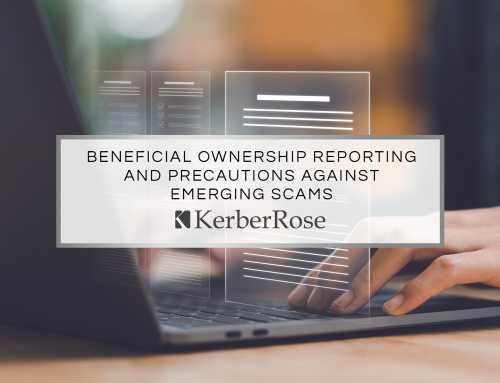Asset Management and Why It’s Important
As your KerberRose Trusted Advisors, we would like to take this opportunity to help our clients better understand the meaning of asset management, its benefits and how our team of financial advisors can assist in reaching financial goals.
What is Asset Management?
Forbes defines asset management as “the service of managing a client’s money.” Asset management is a broad term, which encompasses a variety of services; it is one part of a complete financial success plan. For the sake of brevity, this article will focus on how an asset manager can help clients with portfolio management, which encompasses buying and selling stocks, bonds and other funds.
Successful asset management in relation to portfolio management requires effectively balancing the value of portfolio investments over time and mitigating risk. Depending on the circumstances and needs of the client, the asset management strategy may prioritize one goal over another. For example, younger clients typically seek to maximize returns in exchange for higher risk, while retirees usually seek to preserve the assets they have. This scenario isn’t always the case, as each situation is different; it’s a good idea to work with an asset manager to determine risk tolerance and develop an asset management strategy right for you.
What Does an Asset Manager Do?
An asset manager usually comes in the form of a financial advisor or a wealth manager. In portfolio management, the role of an asset manager is to help investments in a portfolio earn more and reach financial goals more quickly than if a client managed their own assets. Various ways asset managers seek to increase earnings:
- Determining which assets to buy or sell
- Researching market conditions
- Examining economic trends (macro and micro)
- Ascertaining risk tolerance
The Benefits of Having an Asset Manager
One question many people ask is, “Why do I need an asset manager? Why can’t I manage my own portfolio?” As an individual’s assets grow and become more complex, an asset manager can provide many benefits, including:
- Understanding available investments and allocations
- Ensuring your portfolio is appropriately diversified
- Determining when retirement is possible and how much money will be available after retirement
- Evaluating the tax implications of investments
- Having a disciplined coach to help you make the best investment decisions, without letting emotion cloud the process
In essence, an asset manager can start you off on the right foot or get you back on your path when it comes to planning your financial future.
How We Can Help You Achieve Financial Success
KerberRose Wealth Management provides a variety of Investment Advisory and Retirement services to help best manage your assets. Our services go beyond portfolio management to include financial planning, estate reviews, tax strategies and more. All our services can supplement asset management as part of a holistic financial plan. To learn more about our services and how we can help you achieve financial success, contact a Trusted KerberRose Wealth Management Advisor today!
Asset Management and Why It’s Important
As your KerberRose Trusted Advisors, we would like to take this opportunity to help our clients better understand the meaning of asset management, its benefits and how our team of financial advisors can assist in reaching financial goals.
What is Asset Management?
Forbes defines asset management as “the service of managing a client’s money.” Asset management is a broad term, which encompasses a variety of services; it is one part of a complete financial success plan. For the sake of brevity, this article will focus on how an asset manager can help clients with portfolio management, which encompasses buying and selling stocks, bonds and other funds.
Successful asset management in relation to portfolio management requires effectively balancing the value of portfolio investments over time and mitigating risk. Depending on the circumstances and needs of the client, the asset management strategy may prioritize one goal over another. For example, younger clients typically seek to maximize returns in exchange for higher risk, while retirees usually seek to preserve the assets they have. This scenario isn’t always the case, as each situation is different; it’s a good idea to work with an asset manager to determine risk tolerance and develop an asset management strategy right for you.
What Does an Asset Manager Do?
An asset manager usually comes in the form of a financial advisor or a wealth manager. In portfolio management, the role of an asset manager is to help investments in a portfolio earn more and reach financial goals more quickly than if a client managed their own assets. Various ways asset managers seek to increase earnings:
- Determining which assets to buy or sell
- Researching market conditions
- Examining economic trends (macro and micro)
- Ascertaining risk tolerance
The Benefits of Having an Asset Manager
One question many people ask is, “Why do I need an asset manager? Why can’t I manage my own portfolio?” As an individual’s assets grow and become more complex, an asset manager can provide many benefits, including:
- Understanding available investments and allocations
- Ensuring your portfolio is appropriately diversified
- Determining when retirement is possible and how much money will be available after retirement
- Evaluating the tax implications of investments
- Having a disciplined coach to help you make the best investment decisions, without letting emotion cloud the process
In essence, an asset manager can start you off on the right foot or get you back on your path when it comes to planning your financial future.
How We Can Help You Achieve Financial Success
KerberRose Wealth Management provides a variety of Investment Advisory and Retirement services to help best manage your assets. Our services go beyond portfolio management to include financial planning, estate reviews, tax strategies and more. All our services can supplement asset management as part of a holistic financial plan. To learn more about our services and how we can help you achieve financial success, contact a Trusted KerberRose Wealth Management Advisor today!
Asset Management and Why It’s Important
As your KerberRose Trusted Advisors, we would like to take this opportunity to help our clients better understand the meaning of asset management, its benefits and how our team of financial advisors can assist in reaching financial goals.
What is Asset Management?
Forbes defines asset management as “the service of managing a client’s money.” Asset management is a broad term, which encompasses a variety of services; it is one part of a complete financial success plan. For the sake of brevity, this article will focus on how an asset manager can help clients with portfolio management, which encompasses buying and selling stocks, bonds and other funds.
Successful asset management in relation to portfolio management requires effectively balancing the value of portfolio investments over time and mitigating risk. Depending on the circumstances and needs of the client, the asset management strategy may prioritize one goal over another. For example, younger clients typically seek to maximize returns in exchange for higher risk, while retirees usually seek to preserve the assets they have. This scenario isn’t always the case, as each situation is different; it’s a good idea to work with an asset manager to determine risk tolerance and develop an asset management strategy right for you.
What Does an Asset Manager Do?
An asset manager usually comes in the form of a financial advisor or a wealth manager. In portfolio management, the role of an asset manager is to help investments in a portfolio earn more and reach financial goals more quickly than if a client managed their own assets. Various ways asset managers seek to increase earnings:
- Determining which assets to buy or sell
- Researching market conditions
- Examining economic trends (macro and micro)
- Ascertaining risk tolerance
The Benefits of Having an Asset Manager
One question many people ask is, “Why do I need an asset manager? Why can’t I manage my own portfolio?” As an individual’s assets grow and become more complex, an asset manager can provide many benefits, including:
- Understanding available investments and allocations
- Ensuring your portfolio is appropriately diversified
- Determining when retirement is possible and how much money will be available after retirement
- Evaluating the tax implications of investments
- Having a disciplined coach to help you make the best investment decisions, without letting emotion cloud the process
In essence, an asset manager can start you off on the right foot or get you back on your path when it comes to planning your financial future.
How We Can Help You Achieve Financial Success
KerberRose Wealth Management provides a variety of Investment Advisory and Retirement services to help best manage your assets. Our services go beyond portfolio management to include financial planning, estate reviews, tax strategies and more. All our services can supplement asset management as part of a holistic financial plan. To learn more about our services and how we can help you achieve financial success, contact a Trusted KerberRose Wealth Management Advisor today!




